The strange new Canadian citizenship guide: forcing the 19th century relic of the “constitutional monarchy” down our throats
Nov 14th, 2009 | By Citizen X | Category: Key Current Issues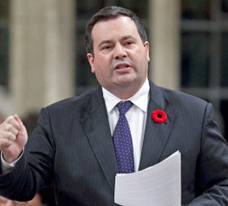
Citizenship and Immigration Minister Jason Kenney speaks in Canadian House of Commons, November 4, 2009. He is the cabinet minister responsible for the Conservative minority government’s quite ideological new citizenship guide. The Canadian Press.
The prize-winning economist Paul Krugman recently wrote: “Every once in a while I feel despair over the fate of the planet.” Earlier this year he also wrote about his “Financial Policy Despair.”
One of the arguably good things about Canada has been that nothing quite important enough to despair over ever quite happens here. But two events from the day before yesterday have left me feeling close to some kind of despair about the Canadian future.
The first was the appearance of the current federal minority government’s new “Study Guide — Discover Canada … The Rights and Responsibilities of Citizenship.” (Online or also in a pdf version, which matches the printed hard copy. In both formats the document is a surprisingly ideological guide for those from other places who want to become Canadian citizens.)
The second event was the regular Thursday night “At Issue” panel on the CBC National news, this time discussing the subject “Royals vs. Republic,” in the immediate wake of the Prince of Wales’s and Duchess of Cornwall’s rather archaic Canadian visit, November 2-12, 2009.
1. Discovering Canada today is first and foremost … a “constitutional monarchy”????
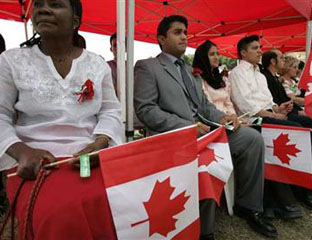
New Canadian citizens at a swearing-in ceremony held at Centennial Park in Etobicoke, Ontario, July 1, 2005 – before the present Conservative minority government came to office.
My two despair-inducing events are related. To me at any rate probably the most bizarre aspect of the new citizenship guide is its aggressive antiquarian stab at reviving Canada’s “constitutional monarchy” – just as opinion polls have been showing that monarchist enthusiasm in the true north strong and free is increasingly a minority taste.
No less an authority than Canwest News, e.g., recently reported: “A majority of Canadians now regularly tell pollsters that they favour a republic … A Canwest News Service poll released last week found that 53% of Canadians surveyed believed the country should cut its ties to the monarchy after the Queen dies … 60% said the Queen and Royal Family should have no formal role in Canadian society … a public opinion survey published in July by the Strategic Counsel suggested 65% of Canadians felt ties to the Crown should be severed upon the death of the Queen. In Quebec, an overwhelming majority (86%) favoured the monarchy’s elimination.”
In reporting on the Canadian visit of the Prince of Wales and his wife, the CBC News website similarly noted that: “Two polls of Canadians ahead of their arrival suggested the popularity of both Charles and the monarchy were low in the country … A Harris-Decima poll released Nov. 2 found only 31 per cent of respondents believed Charles should be the next king, while a poll commissioned by Canadian friends of the Royal Family in October found 60 per cent of Canadians felt a constitutional monarchy was outdated.”
And yet the new citizenship guide stresses right up front, in its “Message to Our Readers,” that “Canada is a constitutional monarchy, a parliamentary democracy and a federal state.”Somewhat further on, in a section called “Who We Are,” the guide declares: “We are the only constitutional monarchy in North America.” Still further along, in a section on “How Canadians Govern Themselves,” the guide further harangues its readers:“There are three key facts about Canada’s system of government: our country is a federal state, a parliamentary democracy and a constitutional monarchy.”
The guide underlines as well, at its very beginning, the current musty Canadian citizenship oath, which reads: “I swear (or affirm) That I will be faithful And bear true allegiance To Her Majesty Queen Elizabeth the Second Queen of Canada Her Heirs and Successors And that I will faithfully observe The laws of Canada And fulfil my duties as a Canadian citizen.”
Finally, there is even a reference to “The Royal Anthem of Canada, ‘God Save the Queen [or King],’” which “can be played or sung on any occasion when Canadians wish to honour the Sovereign.” (Does this mean that we are also going to go back to playing ‘God Save the Queen’ before the movie starts at UK-owned Odeon theatres in Canada again? But wait a minute: there aren’t any Odeon theatres in Canada any more! Well, “Cineplex Odeon” – but that’s different.)
2. Another relic of the 19th century that won’t be reformed
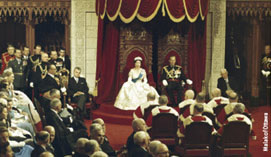
Elizabeth II opens the 23rd Parliament of Canada. The authors of the new 2009 Canadian citizenship guide had to go all the way back to 1957 to find a photo of the British monarch actually opening a Canadian Parliament. We have now progressed to the 40th Parliament of Canada. But the country’s current minority government apparently wants to turn the clock back to 1957 – or much earlier still.
There is of course no doubt that the modern Canadian confederation which began in 1867 was a “constitutional monarchy.” The quasi-colonial language of much of what is now called the Constitution Act, 1867 means that this is still technically the case (until otherwise amended).
The confederation that began in 1867, however, did not see itself as a democracy either. Yet no one would deny that it has subsequently evolved into a democracy – as even now confirmed by the reference to “a free and democratic society” in the Constitution Act, 1982, which finally “patriated” the Canadian Constitution from the Parliament of the United Kingdom.
In this same spirit, it seems odd, to say the least, to be stressing that Canada is still in some very important way a constitutional monarchy, when opinion polls increasingly tell us that “60 per cent of Canadians felt a constitutional monarchy was outdated” and “65% of Canadians felt ties to the Crown should be severed upon the death of the Queen.”
This seems especially odd if the “goal”of the new citizenship guide really is, as Jason Kenney, Minister of Citizenship, Immigration and Multiculturalism, claims, “to foster a sense of cohesion, of a common past, shared values and obligations” – among both new and established Canadian citizens. How does it realistically foster a sense of cohesion today to promote a feature of the 1867 confederation’s past that 60% or more of Canadians now feel is outdated?
Mr. Kenney has also said that his new guide “is responding to a growing public demand for a deeper sense of citizenship … It’s hopefully a useful resource for all Canadians, particularly young Canadians, to better know their country. I’m frankly more concerned about historical amnesia and civic illiteracy amongst native-born young Canadians than I am about immigrants who become Canadians.”
And yet, again, how can you combat “civic illiteracy” among native-born young Canadians when you tell them that something which the majority of the practically sovereign people today feel has outlived its usefulness remains a core Canadian value? Isn’t it exactly this kind of discourse in our fading old official culture that has bred so much civic illiteracy. Isn’t the proper antidote a fresh and more realistic approach to the country’s past, present, and future, that connects with the contemporary real Canada, down on the ground where the increasingly diverse majority of the Canadian people actually live?
Stephen Harper himself, when he first became a minority prime minister, liked to talk about how the current unreformed Senate of Canada was “a relic of the 19th century.” More recently, according to the Hill Times, the “Tories … have abandoned their principles on Senate reform because they will have most of the [appointed, and unreformed] seats in January 2010.”
The ancient monarchical principles currently enshrined in the Constitution Act, 1867 are another relic of the 19th century. And, one can only assume, Mr. Harper’s current minority government, in the midst of abandoning its original hopes about Senate reform, has also finally calculated that, for one reactionary and regressive reason or another, obsolete monarchical principles are still supported by a large enough minority of the early 21st century Canadian people to win a majority of seats in Parliament in Ottawa, given the strange nature of our electoral system, with its current diverse array of political parties.
3. Well, “kind of like a throwback to the 1950s” in any case: a “tough, manly country with military and sports heroes that are all men”
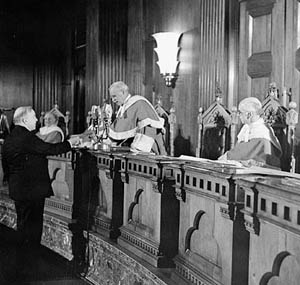
Chief Justice Thibaudeau Rinfret presenting a citizenship certificate to the Rt. Hon. W.L. Mackenzie King, Prime Minister of Canada, during the first citizenship ceremony to take place following the enactment of the first Canadian Citizenship Act in 1947. Before this Act Canadians had just been “British subjects.”
It’s certainly possible that this calculation may ultimately prove correct. And Mr. Kenney’s new citizenship guide is probably a good example of the kind of quasi-Orwellian re-writing of Canada’s more recent history that we will get more and more of, if the Harper Conservatives finally do manage to win a majority government, with, say, just over 40% of the cross-Canada popular vote.
(As matters stand, Mr. Harper’s party won 37.7?% of the popular vote in the October 2008 federal election, 36.3% in the January 2006 election, and they have some 36.6% in the latest EKOS poll for November 12, 2009. Which of course raises another kind of question about Canada’s current dysfunctional democratic political system: How come a party that only a little better than a third of the Canadian people actually voted for gets to redefine what Canada is supposed to be all about in this way? Is that what “constitutional monarchy” really means?)
In any case, the authors of the new guide are apparently claiming that they have finally brought a more authentic account of Canadian history to the attention of new citizens. But what the guide in fact presents is a quite ideological reconstruction of an older version of the Canadian past, which almost systematically undervalues (and even obscures) the very real changes and more forward-looking developments that have taken place during the past half-century or so.
Thus the historian Margaret Conrad has said that the new guide is “kind of like a throwback to the 1950s … a tough, manly country with military and sports heroes that are all men.” A less charitable observer might report that the new guide presents a vaguely updated Colonel Blimp and Brit-o-philiac view of the Canadian past, that sounds quite a lot like Citizenship and Immigration minister Jason Kenney looks. Which is fine enough, no doubt. Except is that really what the democratic majority of the Canadian people want today?
Beyond the obsession with the withering constitutional monarchy, there are more than a few other examples of this back-to-the-future theme in Mr. Kenney’s new citizenship guide. At the start of the “Who We Are” section the guide’s authors enthuse: “A belief in ordered liberty, enterprise, hard work, and fair play have enabled Canadians to build a prosperous society in a rugged environment from our Atlantic shores to the Pacific Ocean and to the Arctic Circle–so much so that poets and songwriters have hailed Canada as the ‘Great Dominion.’”
Really? What poets and songwriters? Are any of them still alive? Who actually talks this way about “the dominion” in Canada today? The old Dominion Bureau of Statistics became Statistics Canada in 1971. The old Dominion Day officially became Canada Day in 1982 – when the Constitution of Canada was finally “patriated” from the United Kingdom in the Constitution Act, 1982. (And, as even Wikipedia knows, “Dominion Day” was only ever the old “Anglophone name of the holiday.” The French name was “Le Jour de la Confédération.” Nowadays the French and English names are the same: Canada Day and Fête du Canada.)
Similarly, most of us outside the Monarchist League of Canada don’t talk about “the dominion” nowadays, because it has a few too many old colonial echoes, for an independent country whose real modern sovereign is the Canadian people. As even Wikipedia knows again: “A dominion, often Dominion, refers to one of a group of semi-autonomous polities that were nominally under British sovereignty, constituting the British Empire and British Commonwealth, from the late 19th century. They included (at varying times) Canada, Australia, New Zealand, Newfoundland, South Africa, and the Irish Free State.”
On some parallel trajectory Mr. Kenney’s new citizenship guide goes on to quote “John Buchan, the 1st Baron Tweedsmuir,” who is said to have been “a popular Governor General of Canada (1935—40).” It even shows a photograph of Lord Tweedsmuir, wearing a Plains Indian headdress. But it does not mention that John Buchan was not a Canadian, as we understand the term today, when people actually do become Canadian citizens. He was a British novelist, who was made into a British aristocrat, in order to qualify as a Canadian governor general, in the days when this office was still filled by British aristocrats (“But as it is! … My language fails / Go out and govern New South Wales,” etc, etc.)
Moreover, the history of Canada presented in the new citizenship guide does not talk about how, since 1952, Canadians effectively appointed by the Canadian prime minister – and not British aristocrats, appointed by the British government – have served as governor generals of Canada. It does not talk about the first Canadian Citizenship Act of 1947, which first created the modern status of a Canadian citizen. (An odd omission in a guide to Canadian citizenship, one might guess?) Or how before this act, Canadians were just “British subjects” and there was no such thing as a Canadian citizen. Or how since the Canadian Citizenship Act of 1977, there is no connection at all between the legal status of a Canadian citizen and a British subject.
There is no mention in the new guide either of the 1947 Letters Patent, by which the British monarch devolved his or her theoretical responsibilities for Canada, under the Constitution Act, 1867, on the Governor General and Commander in Chief of Canada.
4. The nightmare of despair – can the monarchist minority actually dominate the democratic majority in Canada today anyway?
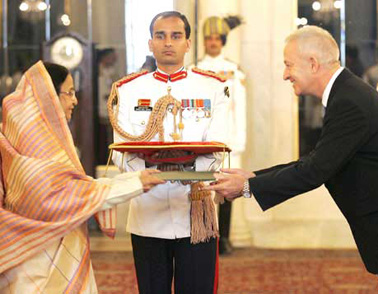
The Ambassador of Ireland to India, Kenneth Thompson, presenting his credentials to the President of India, Pratibha Devisingh Patil at Rashtrapati Bhavan, in New Delhi on November 10, 2008. Here are two parliamentary democracies identical in form to our parliamentary democracy in Canada, that have made the transition from self-governing British dominion and constitutional monarchy to independent parliamentary democratic republic without any great difficulty. Has Andrew Coyne on the “At Issue” panel ever heard of these places?
The strange stress on Canada’s historic constitutional monarchy in the early 21st century free and democratic society isn’t the only ideological peculiarity of the Conservative minority government’s new citizenship guide. To take just one of more than a few other cases in point, the guide presents a view of Canadian regionalism that many Canadians living in Ontario and Quebec might reasonably see as rather odd.
It is a good thing, I should preface my remarks here by making clear, that some attention is paid to Canadian regionalism. It certainly is an important ingredient in “Who We Are” in Canada today. But the new guide’s definition of just what the main Canadian regions are – just like its stress on the fading constitutional monarchy (and various other things) – is quite ideological and politically one-sided. Canada, the guide tells us, “includes many different geographical areas and five distinct regions …Â The Atlantic Provinces … Ontario and Quebec … The Prairie Provinces … The West Coast … The Northern Territories.”
The so-called “West Coast” region, on this definition, includes the single province of British Columbia – Canada’s third most populous province with some 4.5 million people. Which, especially if you happen to come from Ontario or Quebec, only makes you wonder why these two most populous provinces – which together have almost 21 million people, or almost 62% of the total Canadian population (the new citizenship guide merely says “More than half”) – should be counted as a single region?
As anyone who has ever been in the two places knows, Ontario and Quebec are in fact more different from each other – in virtually every way you may choose to classify them, including of course the majority language of the people today – than any other two or three or four or more provinces in the entire modern confederation. Beyond the warping of political and cultural ideology, there is just no good reason for classifying Ontario and Quebec as a single Canadian region in the year 2009. And at the bottom of the ideology that has made this linkage, it seems clear enough to me, is the notion that some Canadians are, as George Orwell might put it, more equal than others. Or, Canada is not a country where every adult citizen is equal to every other – and deserves and has an equal voice in the ultimate counsels of the free and democratic society.
It is at this point that my own mood of despair about the Canadian future starts to set in. And it has been aided and abetted by the regular Thursday night “At Issue” panel on the CBC National news, on November 12, 2009, discussing the subject “Royals vs. Republic.”
You might say, that is, don’t worry if a minority federal government in Ottawa, elected by less than 37% (or at best less than 38%) of the Canadian people, is now insisting that the old British constitutional monarchy is a crucial Canadian institution that must endure forever – even if you do share the belief of a growing majority of Canadians that this monarchy is indeed a 19th century relic, which should just be politely retired when the present monarch passes to her great reward in the sky. Canada really is, first and foremost, a free and democratic society today. And it will finally be what the majority of the Canadian people want it to be.
Alas, however, we have in fact a dysfunctional democratic political system in Ottawa in the early 21st century, in which a political party that wins even less than 40% of the Canada-wide popular vote can still win a majority of seats in the federal Parliament, and effectively do whatever it likes. But, you might say, surely the journalists and pundits who appear on radio and television and write in the newspapers, and interpret the news for Canadian voters, will help mobilize enough of the growing non-monarchist majority to stop Prince Charles from becoming the next King of Canada, however meaningless a title that may now be (to say nothing of confusing to the rest of the world, on the rare moments it wonders just what Canada is nowadays anyway).
Here, again, it was the CBC “At Issue” panel, discussing “Royals vs. Republic” on November 12, that finally mobilized my own despair about a Canadian future I do find quite abhorrent, as insignificant as so many say it is (and in some cases just to distract you from what are, I do in fact think, some quite important practical issues about just what Canada is going to become, or even whether it is going to survive as an independent political entity). We have some very talented pundits and commentators in Canada today, and they often serve we the Canadian people very well. But what I finally concluded on November 12 (the same day the new citizenship guide appeared, oddly enough) was that on the issue of “Royals vs. Republic” our chattering classes are, in all too many cases, quite out of their depth.
The reasons for this are no doubt complex, and beyond anything I have the space or the wit to say here. Very quickly, I’d provisionally speculate that Canada still has quite a few residual vestiges of an old elite culture that was very important in its earlier days, in all regions and among all races, languages, and religions. (Remember the “Family Compact” and all that, in various parts of the country, etc, etc?) The British monarchy has in the past propped up this culture, and it continues to do so today. People who feel a part of this culture often also feel that it somehow makes sense to continue to support the British monarchy in Canada.
So, my ultimate nightmare of despair is that even though a growing majority of us continue to want the old constitutional monarchy to end, for some very excellent reasons that have the ultimate best interests of Canada and the diverse modern Canadian people at heart, it actually will live on, likely enough even rather destructively, for far too long a time. Just because that is what those who are more equal than the rest of us want, for who knows just what twisted reasons of their own.
Of course, I hope this doesn’t happen – and I will certainly do what I can to try to ensure that the majority I side with myself finally does get what it wants. That is certainly one of the responsibilities of the democratic citizenship that even Jason Kenney is presumably urging me to take more seriously.
But we all do have our various nightmares of despair from time to time. And, whatever else, I am not at all happy to think that now I have another one.


Nice overview here. Ultimately, I think new and old Canadians alike could benefit from a better understanding of what it means to be Canadian. Perhaps a definition that is more broad than a consumer of beer and hockey or an American with universal healthcare and a gun license?
This lionization of the monarchy in the new citizenship guide is disconcerting, but it does give some exposure to an issue that is not on the radar of the majority of Canadians. Just who’s bitch are we anyways? America or the UK? Quebec? now Alberta – wtf?!? Let’s settle this once and for all! Perhaps, like how the reign of King George W helped bring about change in the US, this will help wake Canadian’s up and ultimately bring about regime change in the home and native land. Perhaps even to stand up on our own as an independent, democratic nation whose citizenry swear no oath to figureheads of foreign lands. Of course, this will require progressives in Canada to get over themselves and come together, otherwise we’ll be stuck here forever… with only our self righteous indignation and blind faith in Obama to pull us out…
Ah, yes. We’ll replace Elizabeth II with Bill Clinton, or George W Bush, or Richard Nixon, or Kurt Waldheim, the Nazi UN Secretary General and president of Austria, or someone else who’ll bring to our nation’s name great glory and dignity. Careful what you ask for, folks. You might get it.
Hey Ed, ya gotta be kidding, or just terminally dumb. The idea is not to replace a foreign head of state from the UK with a foreign head of state from the US (to say nothing of Austria etc). It’s to have someone who actually lives in Canada as Canada’s head of state. What do you find so alarming about that? Or do you think that there’s no one who does live in our nation who can bring its name great glory and dignity — that we have to be a colony of some other nation forever? Why would anyone want to live in a nation like that nowadays?